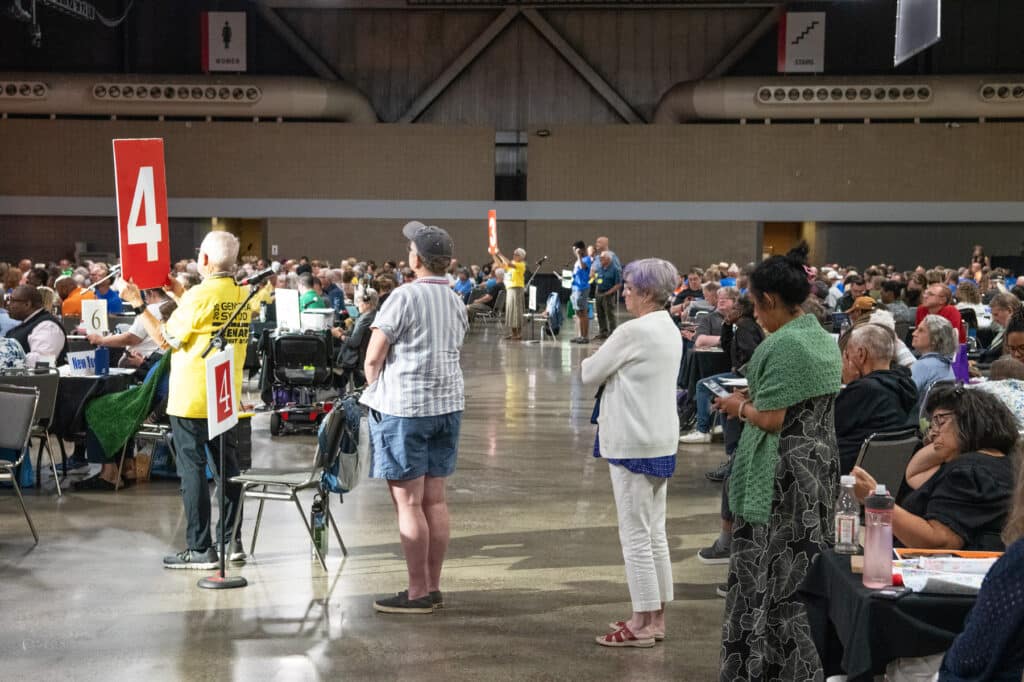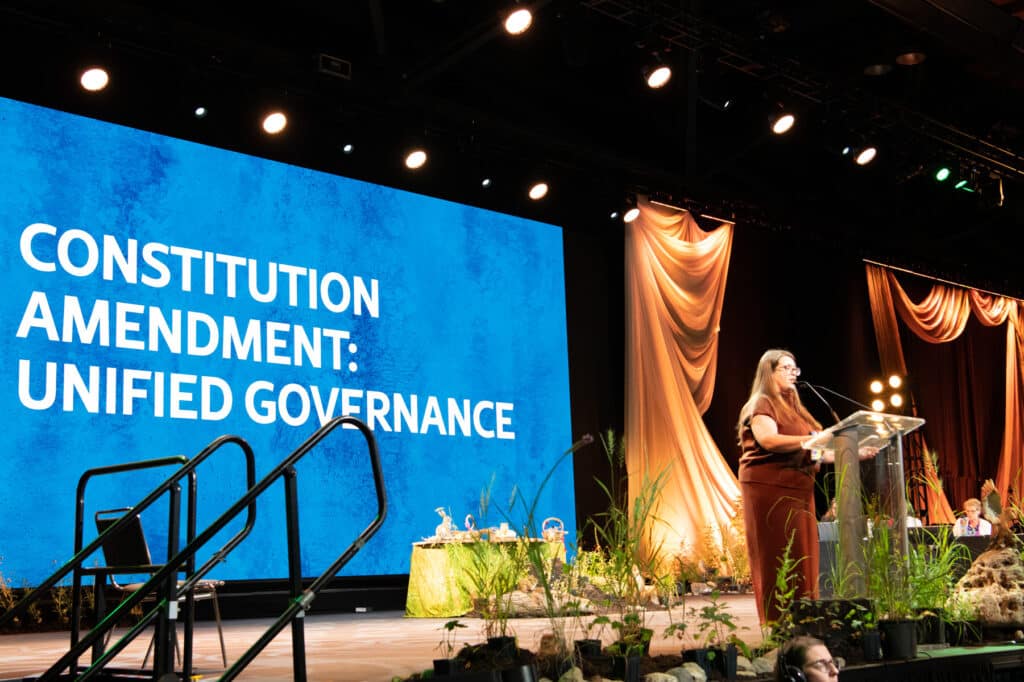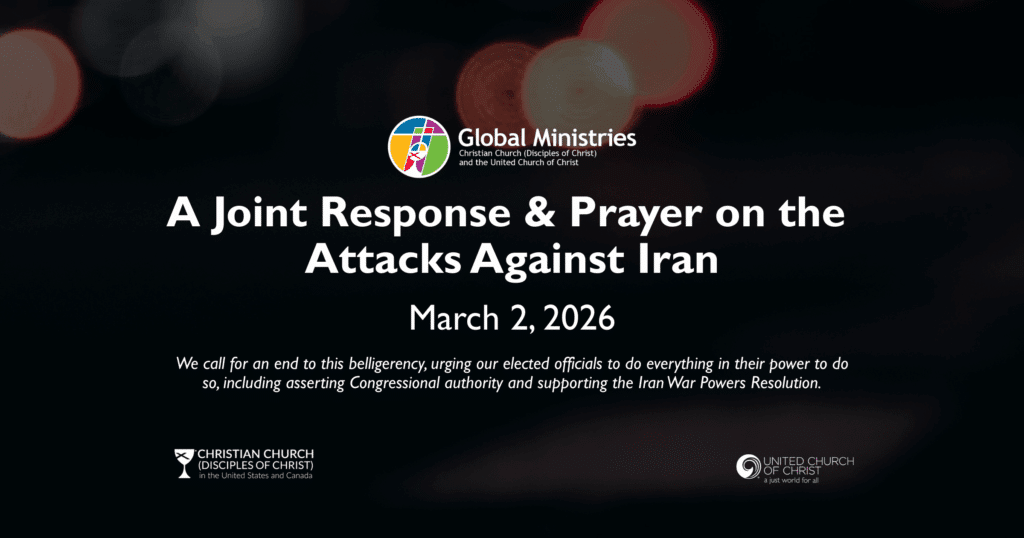Raising alarm about a consolidation of power, Delegates reject Bylaw change
With speakers raising the alarm about a consolidation of power, voters at the 35th General Synod rejected a proposed revision to the UCC Constitution and Bylaws which would have changed the Associate General Minister positions from being elected by Synod to being appointed by the General Minister and President.
The proposal lost by a vote of 407 against and 241 in favor, with 34 abstentions. The revisions needed to be approved by two-thirds of Synod voters, followed by ratification by two-thirds of the Conferences.
Delegates debated the change for 45 minutes, with several speakers pointing to the current Trump administration as an example of the dangers of putting too much power into one person’s hands. Many said that while they trust the current General Minister and President/CEO, the Rev. Karen Georgia Thompson, they wanted to protect against future abuses of authority.

“We are being asked to cede our authority to elect Associate General Ministers,” said Rev. Carly Stucklen Sather of the Illinois Conference. “We’re being asked to put all authority under a General Minister and centralizing all authority under that. Does this sound familiar? I am not a paranoid person, but it sounds an awful lot like what is happening nationally and internationally.”
Rev. Bobby Burtt of the Heartland Conference agreed.
“How do we justify to the outer world that we are consolidating power at the exact time that our government is doing the same and then using that power to harm people?” they asked. “Our denomination is bottom up, not top down.”
Immediate past General Minister and President the Rev. John Dorhauer said he was bristling at such comparisons to the current government, saying he had confidence that the UCC Board of Directors would not abandon their responsibilities to hold future GMP’s responsible.
And the Rev. D’Angelo Smith, a current member of the UCC Board, also expressed his frustration at the comparisons.
“I am hurt, as a Board member, at the comments that have been made that you all don’t trust us to do our job,” he said. “You elected us and called us, too. Prayed for us and believed in us. We are the checks and balances. Allow for the Board to do its work.”
The proposed change was meant to be the final step in a long journey of restructuring that has led the national setting to a system of unified governance. Following the General Synod’s UCC Bylaws amendments in 2017, the Associate General Ministers (formerly Executive Ministers) are no longer chief executives of separate Covenanted Ministries. Now, their portfolios are assigned by the General Minister and President and confirmed by the UCC Board, and they are functionally supervised by the GMP.
The GMP is the chief executive of the Covenanted Ministries and other National Ministry corporations, accountable for the budget, and authorized to make all human resource decisions. In presenting the proposed change, the UCC Board’s Governance Committee argued that the AGMs and GMP are not co-equal, and should not be treated as such in their election by Synod.
Rev. Madison Shockley of the Southern California Nevada Conference said the proposed change is not about consolidating power.
“I was at the General Synods 30 years ago when we had 11 different instrumentalities, and then I came back to the next one, when we had fewer, and the next one, and we had fewer,” he said. “I grieve that contraction, but that’s where we are. We’re making a decision that reflects the reality of who we have become.”
Esperanaza de Jesus Bowles of the Wisconsin Conference said that voting for an Associate General Minister “feels to me a bit like a formality” following the election earlier in the Synod of Shari Prestemon as Associate General Minister.
“We only get one person to pick from and she was incredible – love you Shari – but it feels a bit redundant. This person has already been vetted. They’ve already gone through all the approvals,” she said. “I don’t see this turning into a dictatorship.”
But the Rev. Martha Boyer of the Penn Central Conference said the steps leading up to Prestemon’s election were very satisfying.
“We have been following it for the past year since she was nominated. We’ve been able to research and to hear her presentation. And I felt a total part of the process in her election and feel there’s a sense of accountability because of the whole process that she has gone through,” Boyer said.
Several other speakers spoke in favor of the change, comparing the operations of the national setting to a company in which executives must be allowed to choose the people with whom they can work well to carry out the organization’s mission. Others took exception to the comparison.
“I am a former officer and member of original collegium that initiated the actions that resulted in unified governance, and somehow that has now evolved into a corporate CEO model,” said Edith Guffey. “We are first a covenantal church, not just a corporate body. Shared power and authority have been a value. One expression of that value is the authority of the General Synod to call and elect its leaders, valuing accountability, diversity of people, thought and leadership styles.”
Rev. John Fiscus of the Maine Conference said when he works with churches in search and call, he reminds them that they are calling ministers, not hiring.
“Think about the pastoral authority that we put in the people who run our denomination,” he said. “When we move to a model that is now hiring rather than calling, there seems to be a disconnect with what we believe to be primary about how we become ministers in the United Church of Christ.”
But Dale Mease, a member of the Penn Central Conference Board of Directors, said the change would “provide agility for the leadership of the United Church of Christ. We cannot afford to move at a glacier pace anymore, with having three years between General Synod meetings.”
Delegates did approve with no debate two other bylaw changes that adjusted how long people serve as a Director on the UCC Board or on the United Church Funds Board, or as a Member of the General Synod Nominating Committee. These changes were made in response to the vote at the last Synod which changed the frequency of Synod from every two years to every three. The bylaws were revised to elect board and nominating committee members to two terms of Synod – or six years – rather than three terms, which would be nine years.
Content on ucc.org is copyrighted by the National Setting of the United Church of Christ and may be only shared according to the guidelines outlined here.
Related News
‘We call for an end to this belligerency:’ UCC-DOC joint statement condemns US-Israel attacks on Iran, calls on all countries to refrain from threats
The United Church of Christ and the Christian Church (Disciples of Christ), along with its...
Read MoreUCC GMP issues statement following US/Israel attack on Iran, calls on elected officials to ‘reject war’
The United Church of Christ’s General Minister and President/CEO, the Rev. Karen Georgia...
Read MoreLiberating Women
There is a history of women’s movements in the United States and around the world. Over the...
Read More


